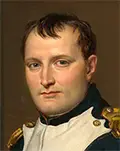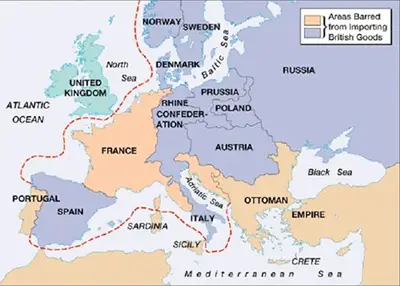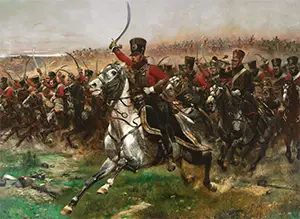The French Invasion of Russia in 1812
Part 1: Background to the Epic Confrontation The French invasion of Russia in 1812 was the largest such military movement in Europe up to that point in history, yet it was an abject failure for France and a Pyrrhic victory for Russia. The two countries had been at war with each other in recent years, in the War of the Second Coalition and the War of the Third Coalition. 
In 1801, Tsar Paul I had considered joining France against the U.K. He didn't live long enough to carry out any plan of that sort, and his son and successor, Alexander I (right), proved much more of an implacable foe of France. It was the French killing of the Duke of Enghien, on fabricated charges of assassination conspiracy, that especially shocked Russia and convinced it to join the Third Coalition. 
France got the better of Russia in that conflict, but Russia fared rather better in the next one, the War of the Fourth Coalition. The Prussian king had fled to Russia rather than surrender to French troops, even as they occupied Berlin, and Emperor Napoleon Bonaparte (left) had carried on into Poland, capturing Warsaw and defeating the Russian Army on Feb. 8, 1807, at the Battle of Eylau, which was fought in a blinding snowstorm. In that nondecisive battle, casualties numbered in the tens of thousands. Both sides settled in for winter. Yet another overwhelming French victory came on June 14, 1807, at Friedland, prompting Russia to surrender. In that battle, quick thinking by Lannes forced the Russian commander, Gen. Leonty Leontyevich Bennigsen, to mass his troops in one spot, making them easier to attack. Lannes had enticed the larger Russian force to The resulting Treaty of Tilsit, signed on July 7, took both Prussia and Russia out of the war, levied Prussia with a huge indemnity, and required both powers to give up territory. Another result was the creation of the Duchy of Warsaw. While in the Prussian capital, Bonaparte had issued the Berlin Decree, on Nov. 21, 1806. This was the creation of the Continental System, a progenitor of the European Common Market that was designed to exclude the U.K. from European trade. Russia was, by the terms of the Treaty of Tilsit, bound not only to join the Continental System but also to declare war on the U.K. The latter happened, to a degree, but never to the extent that Bonaparte wanted. 
Bonaparte and Alexander had met at the Congress of Erfurt in 1808, and Russia had agreed to fight with France if it faced another war against Austria. The War of the Fifth Coalition was a short conflict that officially did not involve Russia, even though Alexander had vowed to fight alongside France. Part of the reason was a growing political yet nonmilitary conflict between the two countries. The Continental System had closed Russian ports to ships from the U.K. (and vice versa), and those closures were having a significant impact on Russian revenues. Tsar Alexander also at this time was lobbying heavily for a way to get direct access to the Mediterranean, with one proposal being the seizure of France and Russia had squabbled over territory formerly belonging to Poland as well. France had played a large part in creating the Duchy of Warsaw, which took territory from Prussia but was on Russia's doorstep, and had defeated Russian troops in Polish territory. In January 1810, Bonaparte vowed not to recreate the Kingdom of Poland. He did eventually refer to his invasion of Russia as the Second Polish War. In the end, Russia left the Continental System. The first break came in 1810 in the form of a Russian tax on all imports of luxury goods, including those from France. The following year, Russia opened its ports to shipments from the U.K. Next page > Alliances and Battle Plans > Page 1, 2, 3, 4, 5 |
|
Social Studies for Kids
copyright 2002–2024
David White



 concentrate on his much larger force, on the west bank of the Alle River, and, further, had held off the much larger force for most of the day until Bonaparte could assemble the rest of the Grand Armée for a counterattack. When the two large armies crashed into each other, 80,000 Frenchmen were fighting 58,000 Russians. The French made good on a push to drive the Russian troops into the town of Friedland and then trapped them there. French artillery proved superior yet again, scattering Russian troops and forcing many of them to try to escape by crossing the river; many drowned. Russia lost one-third of its force to death and injuries; French losses were 9,000.
concentrate on his much larger force, on the west bank of the Alle River, and, further, had held off the much larger force for most of the day until Bonaparte could assemble the rest of the Grand Armée for a counterattack. When the two large armies crashed into each other, 80,000 Frenchmen were fighting 58,000 Russians. The French made good on a push to drive the Russian troops into the town of Friedland and then trapped them there. French artillery proved superior yet again, scattering Russian troops and forcing many of them to try to escape by crossing the river; many drowned. Russia lost one-third of its force to death and injuries; French losses were 9,000. Constantinople; Bonaparte (and indeed, other European leaders) had opposed such a strategy. On a more personal level, Bonaparte had divorced his wife, Josephine, in late 1809 because they had not had a son together and the emperor was on the lookout for a new wife. He wanted to marry Anna, Alexander's sister, but the tsar suggested a two-year waiting period; instead, Bonaparte married Marie Louise, the daughter of the Austrian emperor Francis I.
Constantinople; Bonaparte (and indeed, other European leaders) had opposed such a strategy. On a more personal level, Bonaparte had divorced his wife, Josephine, in late 1809 because they had not had a son together and the emperor was on the lookout for a new wife. He wanted to marry Anna, Alexander's sister, but the tsar suggested a two-year waiting period; instead, Bonaparte married Marie Louise, the daughter of the Austrian emperor Francis I.
